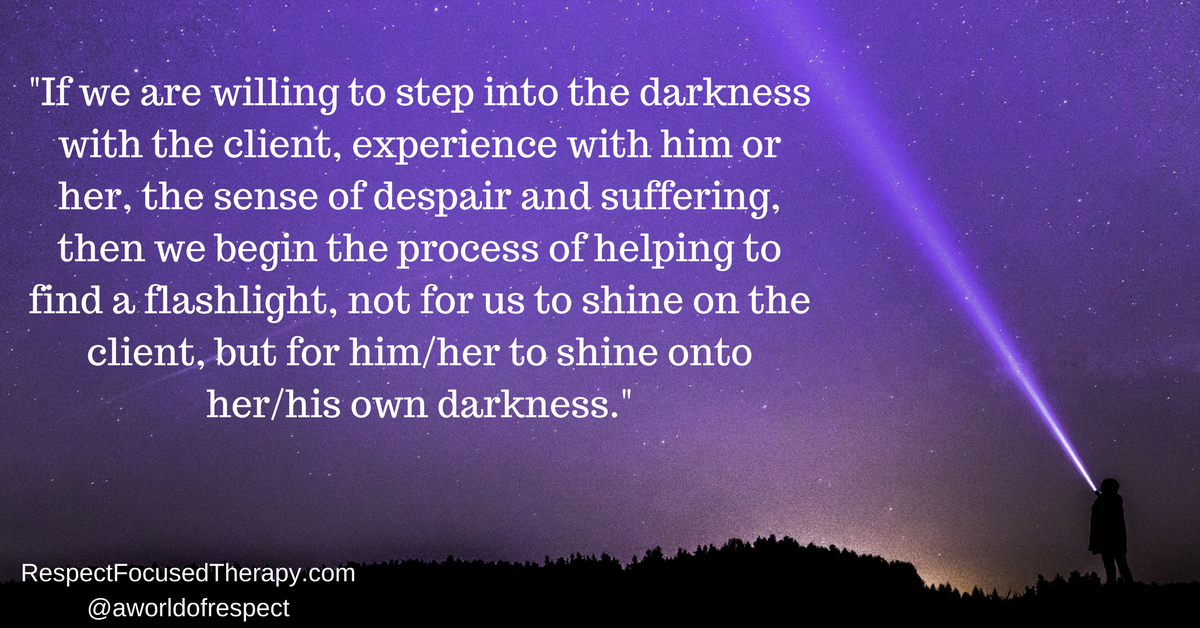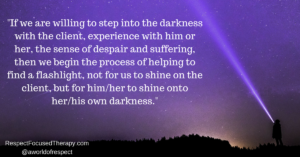

Respecting Grief, a guest blog by Susanne Slay-Westbrook (a 3 1/2 minute read)
Susanne is a contact through the mental health community who has an interesting take on working with grief using respect as a foundation for connection. I greatly appreciate her willingness to share her insights here.
It may seem odd to consider respect within the context of the grieving process. We typically think of empathy and compassion as the appropriate responses to emotional pain. And they certainly are. However using the construct of respect, I believe, adds yet another layer of understanding and therefore a stronger foundation for healing.
For empathy, or the Greek “en patheos,” means “in feeling” and compassion means to be “with passion” or concern; yet the etymology of the word respect is respectare or respicere, meaning “to look again.” To take another look, to reconsider, is to respect, which involves both cognitive and emotional processing. It also means consideration of the entire person and the entirety of their life experiences, as they have experienced them.
This distinction is particularly germane to grief work because the process of grieving is so very personal and unique for each individual. The more we can help clients honor their grief as a healthy response to painful events and walk with them through some of that grief, the more we allow them to process it in the way they most need, without judgment. All or some of the Kubler-Ross stages of grief may appear in various orders and time spans, as they need to occur for each individual. It is important to allow each person to be the driver of his or her own journey.
Most significantly, the grieving person and process should never be in any way pathologized. Grief is a very normal process that all of humanity experience. The fact that each of us do it differently doesn’t suggest deviation from the norm; it simply expands the concept of “normal.”
According to Dr. Joanne Cacciatore, “Grief isn’t a medical issue. Grief is an existential, deeply human issue.” [the MISS Foundation] Therefore, unless a client is at significant risk of self-harm, medication should not be used at all or if so sparingly as a last resort, i.e. in the case of someone with previously diagnosed mental illness.
If we are willing to step into the darkness with the client, experience with him or her, the sense of despair and suffering, then we begin the process of helping to find a flashlight, not for us to shine on the client, but for him/her to shine onto her/his own darkness. At first, this flashlight will seem to have no batteries, emitting no light, only accentuating the darkness, but also honoring the existing power of it. By doing so, letting the flashlight feature the darkness, the client is more able to show it to us and to perhaps see it for themselves a bit differently, as something separate, not quite so commingled in his/her identity, something to be revered on its own. As you both sit in this darkness, its intensity and disquieting presence create awe. Honor the power that it has. The senses can then begin to adjust. Audio, smell, taste and touch, as well as visual acclamation to the darkness begins to make it more bearable and the flashlight can start to shine dimly, but only after such complete recognition of the darkness is fully realized by both therapist and client.
 Susanne Slay-Westbrook has been a in the mental health field for the last 40 years. As a Licensed Professional Counselor-Supervisor and Licensed Marriage and Family Therapist-Supervisor, she has worked with a wide variety of clientele including the intellectually challenged, young children in low income areas, the physically challenged, adults and children with both psychiatric and addiction issues, persons dealing with death and dying and other grief issues, as well as with couples, families and individuals dealing with trauma and interpersonal conflict.
Susanne Slay-Westbrook has been a in the mental health field for the last 40 years. As a Licensed Professional Counselor-Supervisor and Licensed Marriage and Family Therapist-Supervisor, she has worked with a wide variety of clientele including the intellectually challenged, young children in low income areas, the physically challenged, adults and children with both psychiatric and addiction issues, persons dealing with death and dying and other grief issues, as well as with couples, families and individuals dealing with trauma and interpersonal conflict.
Susanne has written two books related to her work: A World of Respect (2001); and Respect-Focused Therapy (2017, Routledge)
Respect-Focused Therapy (RFT) is a foundation on which all modalities and techniques used in therapy can be strongly grounded, in order to produce sound, effective outcomes. This approach offers clients the opportunity to gain experiential understanding of being respected, possibly for the first time, from the therapeutic relationship and then be able to heal old wounds by creating more respect for self and others in the therapeutic process.

